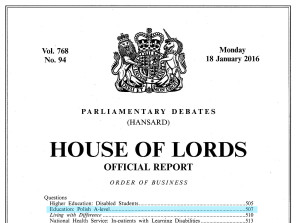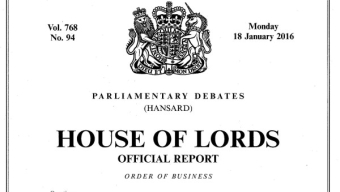W grudniu 2015 roku Lord Alistair Lexden, bliski przyjaciel Lady Haliny Munster i jej śp Męża, Lorda Munster, zaprosił ambasadora RP Witolda Sobkowa na lunch w Izbie Lordόw. Celem tego spotkania było wzajemne zapoznanie oraz poruszenie sprawy przyszłości egzaminu AL z języka polskiego. Tematu, który wydawałoby się został pomyślnie rozwiązany już w czerwcu. Rzeczywistość, niestety, jest jednak inna i walczymy nadal, bo dotychczas nie otrzymaliśmy konkretnego zapewnienia, że egzamin ten rzeczywiście zostanie zachowany. Rozmowy w tej sprawie nadal trwają. Sprawa ta bardzo leży na sercu nie tylko społeczności polskiej w Wielkiej Brytanii, ale również brytyjskim przyjaciołom, którzy doskonale rozumieją korzyści płynące z posiadania dwóch języków. I cenią sobie wkład Polaków nie tylko w dzisiejszy świat biznesu czy rynku pracy, ale również w obronę Anglii i walkę z agresją niemiecką.
 Nic więc dziwnego, że Lord Lexden zapragnął dowiedzieć się czegoś więcej o sytuacji polskiej oświaty w Wielkiej Brytanii i ewentualnych skutków związanych z proponowaną likwidacją egzaminu. Zaprosił więc na lunch pana ambasadora, panią Halinę Munster oraz piszącą te słowa prezes PMS, licząc na to, że otrzyma od nas potrzebne mu dane odnośnie historii egzaminu z języka polskiego, liczby kandydatów, prognozy na przyszłość i tym podobnych szczegółów.
Nic więc dziwnego, że Lord Lexden zapragnął dowiedzieć się czegoś więcej o sytuacji polskiej oświaty w Wielkiej Brytanii i ewentualnych skutków związanych z proponowaną likwidacją egzaminu. Zaprosił więc na lunch pana ambasadora, panią Halinę Munster oraz piszącą te słowa prezes PMS, licząc na to, że otrzyma od nas potrzebne mu dane odnośnie historii egzaminu z języka polskiego, liczby kandydatów, prognozy na przyszłość i tym podobnych szczegółów.
Podczas lunchu, w stylowej restauracji pięknego gmachu parlamentu brytyjskiego i przyjacielskiej rozmowy Lord Alistair podjął decyzję, iż zada w Izbie Lordów bardzo konkretne pytanie odnośnie przyszłości egzaminu AL z języka polskiego.
Procedura stawiania pytań w Izbie Lordów jest bardzo konkretna i prosta. Zainteresowany jakąś tematyką lord stawia pisemne pytanie, kieruje je do odpowiedniej osoby w rządzie, która ma dwa tygodnie na przygotowanie odpowiedzi. Wtedy, w wyznaczonym dniu, pytanie zostaje zadane ustnie podczas debaty w Izbie Lordów i wówczas przez siedem minut toczy się rozmowa na ten konkretny temat. Najpierw odpowiada na pytanie przedstawiciel rządu a potem włączają się w dyskusję inni, zainteresowani tematem lordowie.
I tak Lord Alistair Lexden złożył pisemnie pytanie w pierwszych dniach stycznia. Pytanie brzmiało: Czy Rząd Jej Królewskiej Mości zamierza zachować egzamin AL z języka polskiego? Wciągu następnych dwóch tygodni Lord Alistair poprosił mnie o resume dotychczasowej akcji protestacyjnej oraz argumentów przemawiających za zachowaniem egzaminu. Następnie zaprosił panią Halinę, przedstawiciela Ambasady RP Janusza Wołosza oraz mnie, prezesa PMS, na debatę do Izby Lordów.
18 stycznia spotkaliśmy się przy wejściu do Izby Lordόw. Tego dnia zaprogramowane były cztery pytania; pytanie odnośnie polskiego egzaminu miało być pytaniem drugim. Tradycyjny ceremoniał przebiegu debat w Izbie Lordόw jest pieczołowicie zachowywany: oficjalne wejście przewodniczącej, wniesienie buławy, symbolu władzy, obsługa we frakach i modlitwa na otwarcie obrad. Dopiero wtedy wpuszczono nas na galerię, skąd można było obserwować przebieg debaty i słuchać wypowiedzi lordów.
W dyskusji nad ‘naszym’ pytaniem ośmiu parlamentarzystów zabrało wspierający głos i zadawało pytania skierowane do Lorda Nash, Parliamentary Under-Secretary of State, Department of Education, w sprawie utrzymania egzaminu z języka polskiego na poziomie AL. Debata, choć w sumie bardzo krótka, wykazała bardzo przychylne stanowisko lordów, którzy w narodzie polskim widzą swoich historycznych przyjaciół i obecnych partnerów ekonomicznych. Oficjalna odpowiedź Lorda Nash brzmiała następująco: Szanowni Lordowie, moi Szlachetni Panowie (wypowiedziane po polsku), pozostajemy zobowiązani do zachowania przyszłości istniejącego dzisiaj zestawu kwalifikacji językowych, a między nimi i egzaminu AL z języka polskiego. Współpracujemy nadal z odpowiednimi instytucjami badając sposoby jak najlepiej byłoby przeprowadzać te kwalifikacje w przyszłości.
Lord Lexden przypomniał wtedy, iż język polski jest obecnie drugim językiem używanym w Wielkiej Brytanii; że rośnie liczba kandydatów przystępujących do egzaminu; że partia konserwatywna złożyła przedwyborcze zobowiązanie, że egzamin zostanie zachowany; że Polska Macierz Szkolna współpracuje z AQA celem rozwiązania drobnych problemów związanych z rekrutacją nowych egzaminatorów. Lord Ash przyznał mu rację, zapewniając jeszcze raz, że są zdeterminowani w swoim postanowieniu zachowania tych możliwości językowych, które dla Anglii są ogromnie ważne i wzbogacają ją kulturowo. Padły inne głosy, że zachowanie języków ojczystych grup mniejszościowych jest ogromnie ważne i nie powinny one stać się ofiarą tak dziś promowanego języka mandaryńskiego, którego nauczanie pochłania ogromne sumy pieniędzy. Zwrócono też uwagę na dość nieprzyjemne wypowiedzi premiera, Davida Cameron, wobec Polski i Polaków, które psują relacje między naszymi zaprzyjaźnionymi narodami. Nawiązano też do roli jaką polscy lotnicy odegrali w powietrznej bitwie o Anglię. Zakończono debatę wypowiedzią Lorda Howell z Guildford, który, między innymi, powiedział, że więzi Anglii z Polską są bardzo mocne i tworzyć będą podstawę reform o które dzisiaj w Unii Europejskiej, ubiega się rząd konserwatywny.
Po wysłuchaniu debaty na temat kolejnych dwóch pytań opuściliśmy Izbę Lordów, wdzięczni Lordowi Lexden za zajęcie sią naszą sprawą i przypomnienie lordom, że sprawa egzaminu z języka polskiego nie została jeszcze pomyślnie załatwiona.
Zaraz następnego dnia ukazał się w druku protokół z debaty w wydawnictwie Hansard, House of Lords Official Report (dostępny także w internecie), który przytaczamy w oryginale:
Aleksandra Podhorodecka
Education: Polish A-level
Question
2.43 pm
Asked by Lord Lexden
To ask Her Majesty’s Government whether they plan to preserve the A-level examination in Polish.
The Parliamentary Under-Secretary of State, Department for Education (Lord Nash) (Con): My Lords – or Moi Szlachetni Panowie – we remain committed to securing the future of the existing range of language qualifications, including the Polish A-level. We are therefore continuing to work closely with relevant organisations and others to explore how best to enable these qualifications to be offered in future years.
Lord Lexden (Con): Polish is the second most spoken language in our country. Deep historic ties exist between Great Britain and Poland. Is not the number of candidates sitting A-level Polish increasing, not falling, as is sometimes alleged? Does my noble friend agree that the Conservative Party has given an unambiguous commitment to preserve the Polish A-level exam? Does he also agree that the highly respected Polish Educational Society has put forward effective solutions to the small number of practical difficulties – such as the need to recruit more senior examiners – that have been raised by the AQA and Ofqual?
Lord Nash: Not only are A-levels increasing, but the number of entrants over the last five years for GCSE Polish has gone up by 50%. I agree entirely with my noble friend’s sentiments. We have given a clear commitment. We are determined to ensure that these courses continue. They are very important to us as a trading nation and an outward-facing country, but as my noble friend says they are also particularly important for communities to enable their children to engage with their rich cultural history.
Baroness Ludford (LD): My Lords, of course it is important for immigrants, not just Muslim ones, to learn English, but is it not also important for this linguistically challenged nation to maximise its language resources? Do the Government have a strategy to support the retention and flourishing of what one might call family heritage languages as a source of strength for the economy and trade – indeed, the Minister just referenced that – as well as social, cultural and intellectual enrichment?
Lord Nash: We agree entirely that all pupils should have a rich cultural education. We have made it quite clear that it is particularly important for languages to expose them to a different culture.
Baroness Coussins (CB): My Lords, the Government’s commitment to the continuation of Polish is welcome, but will the Minister also assure the House that the Government’s injection of £10 million into teaching Mandarin in schools will not be at the expense of other languages identified by the British Council as the 10 most vital to the UK for economic, cultural and diplomatic reasons, including French, German and Spanish, as well as lesser-taught languages such as Arabic and Turkish?
Lord Nash: I am happy to give the noble Baroness that assurance. China is obviously a country of huge strategic importance to this country and education is very important in that. A great deal of activity is going on. In addition to the £10 million that we have given to boost Mandarin teaching in schools, excellent work is being done at the IOE Confucius Institute, supported ably by organisations such as HSBC and Swire.
Lord Sherbourne of Didsbury (Con): My Lords, will my noble friend the Minister tell us what progress has been made on teaching foreign languages overall at A-level? In particular, to what extent are we reversing the trend in the teaching of German, which has shown the sharpest decline in recent years?
Lord Nash: My noble friend makes a very good point about the decline in German, but as I said, we believe that, with our expectation that 90% of pupils will take the EBacc, this will further increase the number of pupils taking GCSEs in modern languages. Certainly, the number of pupils taking languages in the EBacc has gone up by 25% over the last five years. We hope that this will have a compounding effect on A-levels.
Lord Taverne (LD): My Lords, do the Government not agree that, while traditionally our relations with Poland have been extremely close, one or two statements recently made by the Prime Minister have not improved them? Would not the encouragement of the learning of Polish by British, as well as other, students be of considerable importance at a time when our relations with Poland are so important?
Lord Nash: I agree entirely with the noble Lord that our relations with Poland are extremely important. We are determined to ensure that a wide suite of languages is available for students so that they have the freedom to choose whichever language they wish to study.
Lord Wallace of Saltaire (LD): My Lords, the noble Lord, Lord Lexden, spoke of the deep historic ties between Britain and Poland. I recall that the Poles produced the largest non-British contingent of pilots in the Battle of Britain, and several squadrons in the RAF and at least two armoured divisions in the Second World War. Britain seems almost entirely to have forgotten about that. I understand that the Prime Minister was unaware of it when he visited Warsaw last time. Could we not do something to symbolise the contribution that Poland made to the British victory in the Second World War, for example by encouraging a visible Polish presence at the next Remembrance Sunday commemorations?
Lord Nash: The noble Lord makes a very good point about the deep debt we owe all the pilots in the Second World War. particularly the Polish pilots who fought so ably, especially in the Battle of Britain. I will take back the point that he makes.
Lord Davies of Oldham (Lab): My Lords, most British citizens are likely to respect the Poles who live and work in this country not for having obtained A-levels in English, although that is greatly to be encouraged, but for providing the skill levels in crucial trades—plumbing is an obvious example, but there are many other such trades—which we are clearly not matching. Are the cuts in further education defensible, given that we clearly have low skill levels in this country in crucial areas?
Lord Nash: The noble Lord makes an extremely good point. Of course, we have a lot of Polish labour here, particularly in certain skills where there are shortages – partly as a result of the booming economy— such as construction. However, our apprenticeships programme is very much focused on rectifying this.
Lord Howell of Guildford (Con): My Lords, I do not think our war-time connections with Poland have been forgotten in any way, and they never will be. On the contrary, 1 think we are constantly reminded of them. However, in considering the teaching of the Polish language, does he agree that Poland recognises the need for the major reform that Europe is now undergoing, and that, despite some differences over the handling of migrant benefits, our relations with Poland are very close indeed and will form a major force in the reform of the European Union which we are now seeking?
Lord Nash: I entirely agree with the noble Lord, and may I congratulate him on his birthday?














